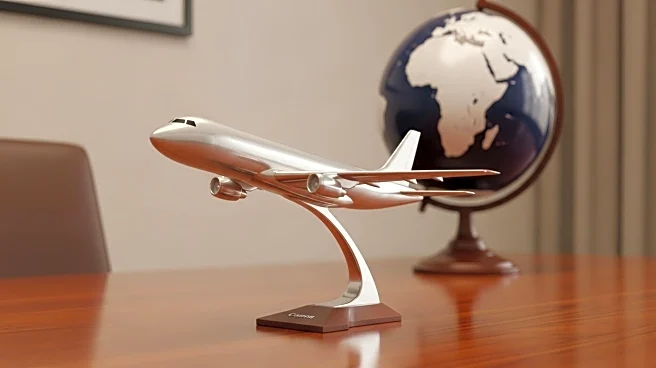What's Happening?
Boeing is reportedly on the brink of securing a significant aircraft order from China, as part of ongoing trade negotiations between the United States and China. This development follows President Trump's efforts to establish a comprehensive trade deal with Beijing. U.S. lawmakers and officials, including U.S. Ambassador to China David Perdue and Representative Adam Smith, have been involved in discussions in Beijing, indicating that negotiations are nearing completion. While the exact size and value of the order remain unspecified, Bloomberg previously reported that China might purchase up to 500 jets. This potential deal marks the first business transaction between Boeing and China since President Trump's first term. Boeing's stock has seen a 22% increase year-to-date, buoyed by these developments and other international orders, including recent deals with Turkey and Uzbekistan Airways.
Why It's Important?
The anticipated Boeing order from China is significant for several reasons. It underscores the impact of President Trump's trade policies on U.S. manufacturing and international commerce. A successful deal would not only boost Boeing's financial performance but also strengthen trade relations between the U.S. and China, potentially easing tensions that have affected global markets. The order could lead to increased production and job creation in the U.S., particularly in states like Washington where Boeing has a substantial manufacturing presence. Additionally, this deal could set a precedent for future trade agreements involving large-scale purchases of American goods, reinforcing the U.S.'s position in global trade negotiations.
What's Next?
As trade talks progress, stakeholders are closely monitoring the situation to see if the Boeing deal will be finalized before the reciprocal tariffs are set to take effect in November. Treasury Secretary Scott Bessent has expressed optimism about reaching a trade agreement with China, which could further influence Boeing's stock performance and broader market dynamics. The outcome of these negotiations may also impact other sectors involved in U.S.-China trade, potentially leading to additional agreements or adjustments in tariff policies.
Beyond the Headlines
Beyond the immediate economic implications, the Boeing-China deal could have broader geopolitical ramifications. It may signal a shift in U.S.-China relations, fostering a more collaborative approach to trade and diplomacy. This development could also influence other countries' trade strategies with the U.S., as they observe the benefits of engaging in large-scale transactions with American companies. Furthermore, the deal could impact Boeing's strategic positioning in the global aerospace market, enhancing its competitive edge against rivals like Airbus.












